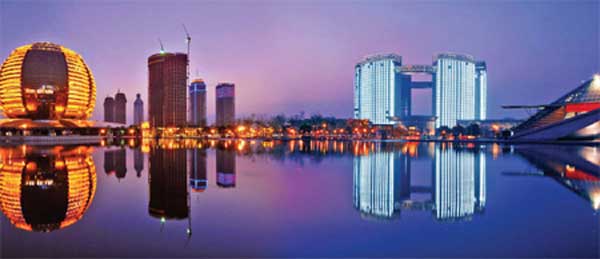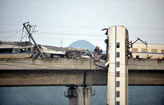Green China
Double vision
Updated: 2011-07-29 12:19
By Alexis Hooi, Hu Haiyan and Zhang Jianming (China Daily European Weekly)
 |
|
A night view of the Hangzhou Qianjiang New City, the city's central business district.Provided by Hangzhou Information Office |
Prosperous Hangzhou banks on creative energies to bridge traditional and modern sectors
Zhang Buwen is only in his third year of college, but he is already making up to 100,000 yuan (10,700 euros) a month from a home-grown business he started two years ago. His budding entrepreneurship becomes more impressive with the fact that he is selling postcards, a paper-based trade in an increasingly digitized world.
With less than 10 other students, Zhang produces postcards that include painted images of Hangzhou. The girls in his team also pen messages for the cards that allude to the beauty of Zhejiang's provincial capital, famous for being a cultural center that has inspired poets throughout the ages.
Zhang, 23, maintains that his postcards are necessary precisely because young, IT-reliant people are becoming too detached from the "personal touch" in communication.
"Sometimes I feel that I'm not running a business. I'm actually living my dream," he says.
But the marketing major from Hangzhou Dianzi University also sells most of his cards through 200 shops online - and that is why he is a fitting example of how the city is trying to tap its cultural and creative energies to face the new challenges of the global economy.
Hangzhou is one of China's most developed cities, with a GDP of more than 594.58 billion yuan for 2010 and a double digit annual economic growth rate for 20 consecutive years, government statistics show.
It has a permanent resident population of 8.7 million people and a GDP per capita of more than $10,000 (7,000 euros).
The city's economic strength lies in sectors ranging from traditional ones such as tea, silk and agriculture to modern and creative fields including IT, animation and medicine.
Tourism also forms a major part of Hangzhou's economy, with the city's iconic West Lake recently making it to UNESCO's World Heritage List.
 |
"Hangzhou is upgrading its cultural and creative industries, by using our history and heritage, to ride on the trends of the global economy," says Lu Zhengpin, deputy director of the city's cultural and creative industry office.
"Hangzhou has invested a lot of effort to realize this goal. For instance, it set up special funds for its cultural and creative industries. Since 2007, it has helped to attract about 15 billion yuan for 1,360 programs in the sectors," he says.
"The local government has also cooperated with nine banks to provide loans to companies of these industries. Last year, 4.5 billion yuan in loans were provided to companies," Lu says.
Hangzhou has also been building industrial parks for the cultural and creative industries.
New parks and zones for the industries covered 1.24 million square meters last year, a year-on-year increase of 85 percent, official figures show.
The number of companies setting up operations in these areas also rose to 1,437, up by 71.68 percent from that of the previous year.
Similarly, there were 23,074 workers in these parks, up by 53.5 percent a year earlier.
"Hangzhou also helps local companies in the cultural and creative industries to go public. It has set up a special investment company to help them get listed. There are preferential policies such as tax incentives for young people to set up their businesses," Lu says.
"All these will help Hangzhou attract more talent. The city is already one of the country's top tourist destinations with its natural scenery, historic sites and comfortable way of life," Lu says.
"Other than the high-tech, economic development zones, we also have hubs to draw the thinkers, innovators and artists so that they can fuel the creative sector."
Many entrepreneurs already credit Hangzhou's business environment for helping to draw businesses.
Alibaba Group Holding Ltd, China's e-commerce giant, is based in Hangzhou.
Jack Ma, Alibaba's chairman and CEO, once explained the reasons behind his group's move to set up its headquarters in the city.
"Hangzhou boasts favorable conditions for e-commerce companies like us. For instance, labor cost here is fairly lower than that of other first-tier cities, and the private economy here is very dynamic, giving birth to many well-developed private companies, providing a rich customer base for us," Ma said.
Taobao, Alibaba's online retail unit, was started as a marketplace for consumers to buy and sell goods to each other. It now controls 80 percent of China's online retail market with its 370 million registered members.
In his latest letter to employees, Ma said the company will not exclude the possibility of listing Alibaba Group.
Many also see the move as a potential tactic to deal with tense relations between Alibaba and its biggest shareholder, Yahoo! Inc.
Recognizing Hangzhou's position as one of the most vibrant places for the country's e-commerce, the China E-commerce Association dubbed the city "the capital of China's e-commerce" in 2008.

Specials

Wen pledges 'open' probe
Design flaws in the signal equipment led to Saturday's fatal high-speed train collision, authorities say.

Turning up the heat
Traditional Chinese medicine using moxa, or mugwort herb, is once again becoming fashionable

Ciao, Yao
Yao Ming announced his retirement from basketball, staging an emotional end to a glorious career.